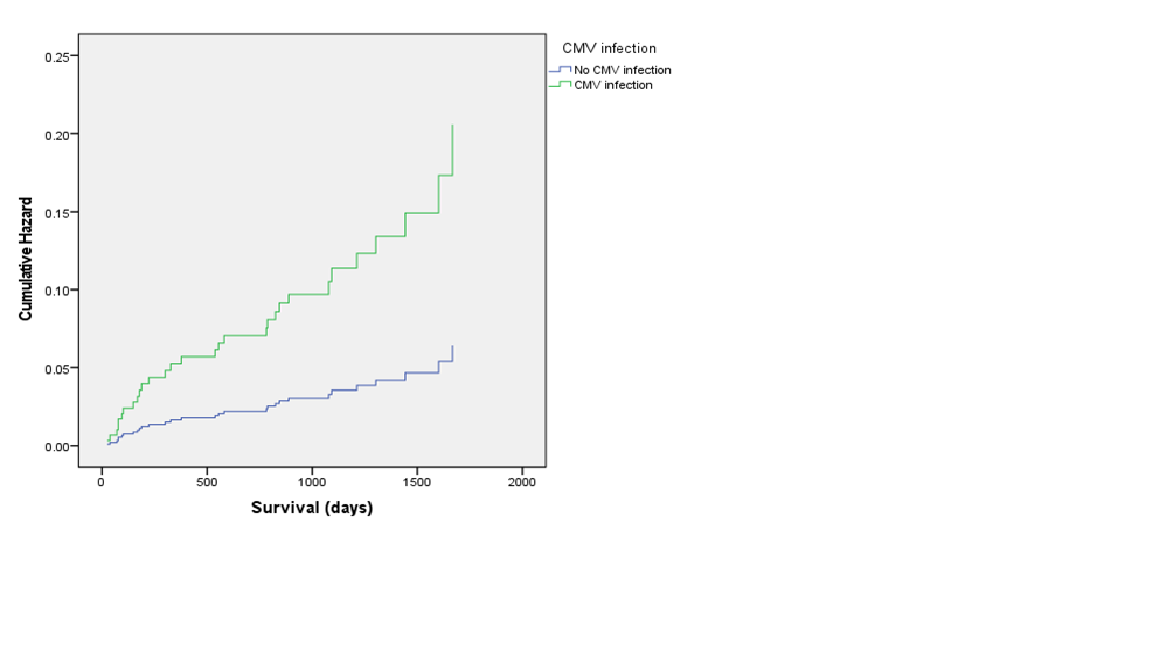The Effect of Late-Onset Cytomegalovirus Infection on the Outcome of Renal Allograft in Patients with Delayed Graft Function
M. Rahimi Shahmirzadi1, M. Silverman1, L. Gunaratnam2, A. Jevnikar2, A. A. House2, S. Hosseini-Moghaddam3
1Infectious Diseases Care Program, St. Joseph's Health Care London, London, ON, Canada, 2London Health Sciences Centre, London, ON, Canada, 3St. Joseph's Health Care London, London, ON, Canada
Meeting: 2022 American Transplant Congress
Abstract number: 997
Keywords: Cytomeglovirus, Graft function, Graft survival, Kidney transplantation
Topic: Clinical Science » Infection Disease » 25 - Kidney Infectious Non-Polyoma & Non-Viral Hepatitis
Session Information
Session Name: Kidney Infectious Non-Polyoma & Non-Viral Hepatitis
Session Type: Poster Abstract
Date: Sunday, June 5, 2022
Session Time: 7:00pm-8:00pm
 Presentation Time: 7:00pm-8:00pm
Presentation Time: 7:00pm-8:00pm
Location: Hynes Halls C & D
*Purpose: Delayed graft function (DGF) has been reported to increase the risk of renal allograft loss. The role of late-onset Cytomegalovirus infection in the association between DGF and graft failure has not been determined.
*Methods: We conducted a retrospective cohort including all patients who received renal allografts at London Health Sciences Centre from Jan 1st, 2014 and December 30th, 2017. The outcome of interest was graft loss and patients remained under clinical follow-up until Feb 28, 2020. In Mantel-Haenszel analysis, we stratified the risk of graft loss considering the variables of allograft rejection and late-onset Cytomegalovirus infection. We also determined the effect of Cytomegalovirus infection on the association between DGF and graft loss as a time-dependent variable (i.e., adjusted hazard ratio).
*Results: Of 384 recipients [median age (IQR): 55 (43.3-63); 38.7% female], 57 (14.8%) developed DGF (14.8%). DGF significantly increased the risk of late-onset CMV infection [13 (22.8) vs 37 (11.3%), P=0.017]. Patients with DGF were at a greater risk of graft loss compared to patients without DGF [10 (17.5%) vs 20 (6.1%), P=0.007)]. In stratified analysis, late-onset Cytomegalovirus infection (adjusted OR: 4.7, 95% CI: 2.07-10.68) and allograft rejection (adjusted OR: 9.59, 95% CI: 4.15-22.16) significantly increased the risk of graft loss in patients with DGF. Late-onset Cytomegalovirus infection, as a time-dependent variable, was independently associated with a considerable risk of graft failure (adjusted HR: 3.19, 95% CI: 1.49-6.84).
*Conclusions: Late-onset Cytomegalovirus infection independently increases the risk of allograft loss in patients with DGF. Targeted Cytomegalovirus monitoring and surveillance may reduce the risk of renal allograft failure in patients with DGF. Further studies are required.
To cite this abstract in AMA style:
Shahmirzadi MRahimi, Silverman M, Gunaratnam L, Jevnikar A, House AA, Hosseini-Moghaddam S. The Effect of Late-Onset Cytomegalovirus Infection on the Outcome of Renal Allograft in Patients with Delayed Graft Function [abstract]. Am J Transplant. 2022; 22 (suppl 3). https://atcmeetingabstracts.com/abstract/the-effect-of-late-onset-cytomegalovirus-infection-on-the-outcome-of-renal-allograft-in-patients-with-delayed-graft-function/. Accessed February 23, 2026.« Back to 2022 American Transplant Congress

